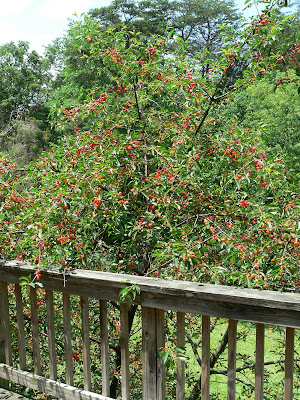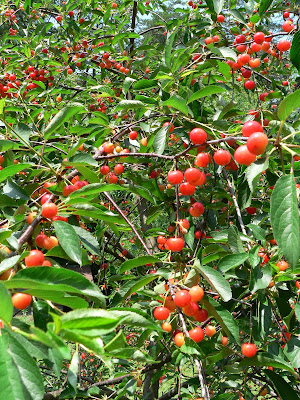Our very best project, though, did not come from the book. I decided to follow our cherry tree. What I mean is that the homeschoolers and I observed the tree closely, from the first swellings on the branch to ripe fruit. We drew (and wrote about) the multiple stages, sometimes several days in a row.
I've been trying to write this post since Thursday (the first day of spring), and finally here are pictures and notes from our study. The children were 11, 8, and 5 (plus the one year old!). I did some drawing, too, which was a real treat. Just like teaching makes one learn more thoroughly, so drawing made me more observant.
Our cherry tree is right next to the deck,
 so we started by choosing a particular branch that hung over the railing. We started drawing when it had only brown swellings.
so we started by choosing a particular branch that hung over the railing. We started drawing when it had only brown swellings. I drew (after the first day) in a small, spiral notebook, but had the children use larger paper that could be punched and stored in a three-ring binder. When the paper is separate, it's so much easier to make another try if a child gets frustrated with an unsatisfactory picture.
I drew (after the first day) in a small, spiral notebook, but had the children use larger paper that could be punched and stored in a three-ring binder. When the paper is separate, it's so much easier to make another try if a child gets frustrated with an unsatisfactory picture.We wrote notes with nearly every drawing, explaining our observations, and usually recording the weather, too. Sometimes the children did their own writing, but there were other days when I took dictation, even from the older ones. Time was occasionally a factor, plus mine would often say more if someone else was writing it down. (And my printing fits on the page better!)
 We observed almost every day, but only drew when the change was significant.
We observed almost every day, but only drew when the change was significant.

Above and below, two versions of the same bud--different skill levels, but the same details noted. These buds are turning green, but they are not leaves--just the covering of the blossoms.
These buds are turning green, but they are not leaves--just the covering of the blossoms. Blossoming time is getting closer...
Blossoming time is getting closer...
 With open blooms to draw the next day:
With open blooms to draw the next day:

 And then the leaves appeared! The reason cherry trees (and others) are so beautiful in the spring is that the blossoms open BEFORE the leaves do. It's one thing to know this, but another to watch day by day by day, and really SEE it. The drawings so far go from March 17 to April 14.
And then the leaves appeared! The reason cherry trees (and others) are so beautiful in the spring is that the blossoms open BEFORE the leaves do. It's one thing to know this, but another to watch day by day by day, and really SEE it. The drawings so far go from March 17 to April 14.
 The next stage was really cool! The petals fell off, but the carpel and stamens remained. The ovaries of the pollinated flowers began to swell--the beginnning of their fruit.
The next stage was really cool! The petals fell off, but the carpel and stamens remained. The ovaries of the pollinated flowers began to swell--the beginnning of their fruit.
 When the cherries were still tiny (see below), we dissected one. The pit was there, but still soft.
When the cherries were still tiny (see below), we dissected one. The pit was there, but still soft.
 All along we had noticed that the side of the tree facing the afternoon sun (our house shades the other side from morning sun) progressed more quickly. As the cherries grew, we noticed that not only did one part of the tree ripen more quickly, but the sunny side of each cherry also changed color sooner!
All along we had noticed that the side of the tree facing the afternoon sun (our house shades the other side from morning sun) progressed more quickly. As the cherries grew, we noticed that not only did one part of the tree ripen more quickly, but the sunny side of each cherry also changed color sooner! Another service I provided my children (besides encouragement and some writing) was color advice. We used Prismacolor pencils, which come in many tints and shades, and also blend well. On some of my pages I recorded colors that were accurate for the current stage. I even tried out (for all our benefit) different combinations/blends to help get just the right green (it changed frequently) or new red highlight. It was fun for me to experiment, and my students appreciated the chance to be accurate without sorting through the big box of 72. (Yes, 72--it was a Christmas present one year!)
Another service I provided my children (besides encouragement and some writing) was color advice. We used Prismacolor pencils, which come in many tints and shades, and also blend well. On some of my pages I recorded colors that were accurate for the current stage. I even tried out (for all our benefit) different combinations/blends to help get just the right green (it changed frequently) or new red highlight. It was fun for me to experiment, and my students appreciated the chance to be accurate without sorting through the big box of 72. (Yes, 72--it was a Christmas present one year!) This long ago, long-term project (June 2 is the last recorded date) is still one of our best ever. We've always had a great affection for our tree and its fruit, but that up-close-and-personal view made the harvest that much sweeter.
This long ago, long-term project (June 2 is the last recorded date) is still one of our best ever. We've always had a great affection for our tree and its fruit, but that up-close-and-personal view made the harvest that much sweeter.
 These buds are turning green, but they are not leaves--just the covering of the blossoms.
These buds are turning green, but they are not leaves--just the covering of the blossoms. Blossoming time is getting closer...
Blossoming time is getting closer...
 With open blooms to draw the next day:
With open blooms to draw the next day:

 And then the leaves appeared! The reason cherry trees (and others) are so beautiful in the spring is that the blossoms open BEFORE the leaves do. It's one thing to know this, but another to watch day by day by day, and really SEE it. The drawings so far go from March 17 to April 14.
And then the leaves appeared! The reason cherry trees (and others) are so beautiful in the spring is that the blossoms open BEFORE the leaves do. It's one thing to know this, but another to watch day by day by day, and really SEE it. The drawings so far go from March 17 to April 14.
 The next stage was really cool! The petals fell off, but the carpel and stamens remained. The ovaries of the pollinated flowers began to swell--the beginnning of their fruit.
The next stage was really cool! The petals fell off, but the carpel and stamens remained. The ovaries of the pollinated flowers began to swell--the beginnning of their fruit.
 When the cherries were still tiny (see below), we dissected one. The pit was there, but still soft.
When the cherries were still tiny (see below), we dissected one. The pit was there, but still soft.
 All along we had noticed that the side of the tree facing the afternoon sun (our house shades the other side from morning sun) progressed more quickly. As the cherries grew, we noticed that not only did one part of the tree ripen more quickly, but the sunny side of each cherry also changed color sooner!
All along we had noticed that the side of the tree facing the afternoon sun (our house shades the other side from morning sun) progressed more quickly. As the cherries grew, we noticed that not only did one part of the tree ripen more quickly, but the sunny side of each cherry also changed color sooner! Another service I provided my children (besides encouragement and some writing) was color advice. We used Prismacolor pencils, which come in many tints and shades, and also blend well. On some of my pages I recorded colors that were accurate for the current stage. I even tried out (for all our benefit) different combinations/blends to help get just the right green (it changed frequently) or new red highlight. It was fun for me to experiment, and my students appreciated the chance to be accurate without sorting through the big box of 72. (Yes, 72--it was a Christmas present one year!)
Another service I provided my children (besides encouragement and some writing) was color advice. We used Prismacolor pencils, which come in many tints and shades, and also blend well. On some of my pages I recorded colors that were accurate for the current stage. I even tried out (for all our benefit) different combinations/blends to help get just the right green (it changed frequently) or new red highlight. It was fun for me to experiment, and my students appreciated the chance to be accurate without sorting through the big box of 72. (Yes, 72--it was a Christmas present one year!) This long ago, long-term project (June 2 is the last recorded date) is still one of our best ever. We've always had a great affection for our tree and its fruit, but that up-close-and-personal view made the harvest that much sweeter.
This long ago, long-term project (June 2 is the last recorded date) is still one of our best ever. We've always had a great affection for our tree and its fruit, but that up-close-and-personal view made the harvest that much sweeter.
Absolutely BRILLIANT!
ReplyDeleteWe are going to follow in your example --- thank you for this very timely post!
With gratitude...
All's grace,
Ann
I knew this post might be late for southerners, but thought there was still time for plenty of folks to enjoy the project this spring.
ReplyDeleteI just read about your orchard. I'm so sorry.